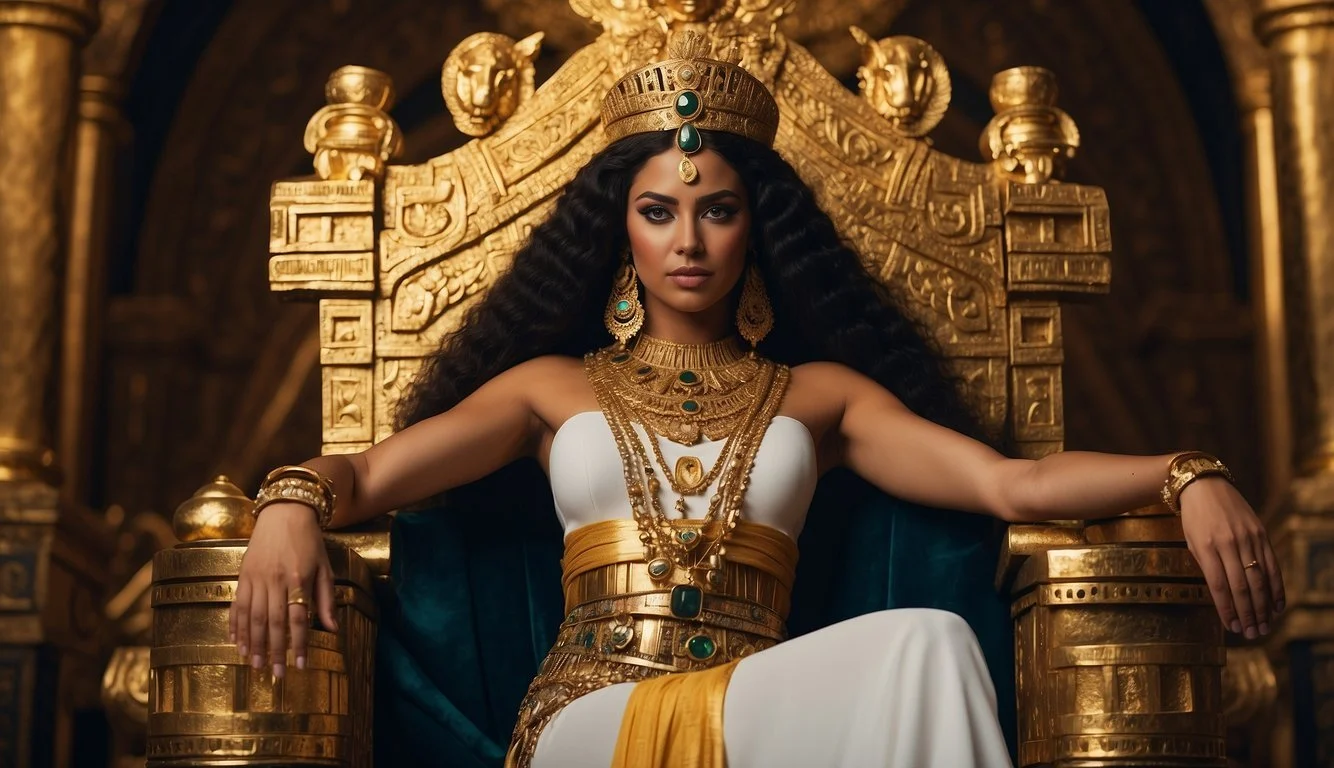Documentary Review: Queen Cleopatra (2023)
A Deep Dive Into Her Legacy
Queen Cleopatra, a 2023 Netflix docudrama, takes viewers through the life of one of history’s most iconic female rulers. Despite its ambitious goal, the series seems to waver between self-importance and educational intent, making it a mixed viewing experience. The docudrama aims to highlight Cleopatra’s influence and legacy, but critics believe it falls short in blending factual history with engaging storytelling.
The series, narrated by executive producer Jada Pinkett Smith, spans four episodes covering Cleopatra's rule over Egypt, from her rise to her tragic demise. Featuring actors like Adele James and Craig Russell, the show aspires to bring Cleopatra's story to life for a modern audience.
This portrayal also sparks discussions on representation and historical accuracy, given Cleopatra’s Macedonian Greek lineage and her depiction as an African queen in the series. These elements add layers of complexity and controversy, making Queen Cleopatra a fascinating, if flawed, addition to historical documentaries.
Historical Context of Cleopatra
Cleopatra VII was born in 69 BC into the Ptolemaic dynasty. This dynasty was established by Ptolemy I Soter, a general under Alexander the Great. Following Alexander’s conquest of Egypt in 332 BC, Ptolemy I became the ruler and founded a line of pharaohs that lasted nearly 300 years.
The Ptolemies were of Macedonian Greek origin and ruled Egypt from Alexandria. Cleopatra herself was well-educated and multilingual, speaking several languages including Greek and Egyptian. This enabled her to communicate effectively with different cultures and maintain her power.
Cleopatra co-ruled with her father Ptolemy XII initially and later with her brothers, Ptolemy XIII and Ptolemy XIV, whom she married as per Egyptian custom. Her reign was marked by political alliances and Roman involvement.
She is notably remembered for her relationships with Roman leaders Julius Caesar and Mark Antony. These alliances were strategic, aimed at securing her kingdom's independence amid the expanding Roman Empire.
Cleopatra ruled until her death in 30 BC, after which Egypt became a province of the Roman Empire. She was the last active ruler of the Ptolemaic Kingdom, and her death marked the end of Hellenistic rule in Egypt.
Film Synopsis
Queen Cleopatra is a Netflix documentary series that delves into the life and reign of Cleopatra VII, the last active ruler of the Ptolemaic Kingdom of Egypt. The series is narrated by Jada Pinkett Smith and features Adele James as Cleopatra.
The series highlights Cleopatra's ascension to the throne at a young age following her father's wishes. She navigates through intense sibling rivalries to secure her position as queen.
A key aspect of the documentary is Cleopatra's alliances with notable Roman leaders. Her relationships with figures like Julius Caesar and Mark Antony play a significant role in the narrative, showcasing her diplomatic and political acumen.
The series spans Cleopatra's rule from 51 BC to 30 BC. It covers significant events such as major battles, political strategies, and her ultimate demise by suicide, which marked the end of the Ptolemaic dynasty.
Queen Cleopatra combines historical reenactments and expert interviews to provide detailed insights into Cleopatra’s life, emphasizing her intelligence and leadership qualities. The documentary portrays her as a powerful and influential figure in ancient history.
This four-part series aims to educate viewers about the complexities surrounding Cleopatra's reign, her strategic decisions, and her legacy as one of history's most prolific female rulers. Each episode offers a blend of historical facts and dramatic storytelling to engage audiences.
Production Overview
The production of "Queen Cleopatra" takes a comprehensive approach, focusing on the director's vision, strategic casting choices, diverse filming locations, and a captivating musical score. Each element contributes to bringing the ancient world of Cleopatra to life.
Director's Vision
The docuseries "Queen Cleopatra" is directed by Tina Gharavi. Her vision was to present Cleopatra not only as a historical figure but as a multifaceted queen with both power and vulnerability. Gharavi aimed to challenge preconceived notions, emphasizing Cleopatra’s African heritage along with her nuanced role in history. This direction aims to combine factual accuracy with dramatic storytelling to appeal to a broad audience, blending educational content with engaging visuals.
Casting Choices
The casting of Adele James in the titular role has been a significant talking point. Chosen for her ability to bring depth and authenticity to Cleopatra, James provides a compelling portrayal that resonates with viewers. Jada Pinkett Smith, who also serves as the executive producer, narrates the series. Supporting roles include Craig Russell and John Partridge, who add to the dynamic representation of historical figures, making the story robust and multifaceted.
Filming Locations
"Queen Cleopatra" employs a variety of filming locations to enhance its authenticity. While the primary action is set in Alexandria and other parts of Egypt, additional scenes were filmed in Mediterranean settings to replicate ancient environments. These locations were chosen for their historical resonance and visual appeal. The use of real-world settings over CGI helps ground the docuseries in a tactile, believable reality, allowing viewers to immerse themselves in Cleopatra’s world.
Music and Scoring
The musical score for "Queen Cleopatra" is crafted by celebrated composer Trevor Morris. Known for his work on "The Tudors" and "Vikings," Morris provides a soundtrack that blends traditional Egyptian instruments with contemporary orchestral elements. This fusion underscores the narrative, heightening emotional moments and setting an evocative tone throughout the series. The music not only enhances the visual experience but also helps in portraying the cultural richness of Cleopatra’s reign.
Major Themes and Interpretations
Cultural Identity
The documentary explores Cleopatra's cultural heritage, highlighting her African and Greek roots. This duality is significant in understanding her political and personal life, drawing attention to her influence in both cultural spheres.
Political Strategy
Cleopatra is depicted as a shrewd political strategist. Her alliances with Julius Caesar and Mark Antony are shown as calculated moves to sustain her reign and protect Egypt's sovereignty. The series delves into her diplomatic maneuvers and their implications.
Female Empowerment
An emphasis is placed on Cleopatra as a powerful female ruler. Her leadership in a male-dominated era underscores themes of female empowerment and resilience, challenging contemporary and modern gender norms.
Historical Accuracy vs. Creative License
The series generates discussions on historical authenticity. Some creative liberties are taken, particularly in casting and dramatization, which may raise questions about historical integrity but also aim to bring her story to a wider audience.
Legacy and Myth
Examining how Cleopatra's legacy has been shaped over centuries, the documentary contrasts historical facts with myths. This includes her portrayal in literature and film, revealing how her image has been romanticized and politicized over time.
Personal Intrigues
Cleopatra's personal life—her relationships and familial alliances—receive significant focus. These elements are intertwined with broader political narratives, providing a holistic view of her as both a ruler and a woman navigating complex dynamics.
These major themes are dissected through interviews, expert commentary, and dramatizations that together provide a comprehensive interpretation of Cleopatra's life and reign.
Critical Reception
The documentary "Queen Cleopatra" has garnered mixed reactions from critics, varied responses from audiences, and exhibited notable performance metrics.
Professional Critics' Reviews
Professional reviews for "Queen Cleopatra" have been mixed. Critics have praised the series for its attempt to illuminate the life of Cleopatra through a contemporary docudrama format. The narration by Jada Pinkett Smith received appreciation for adding a prominent voice to the storytelling.
However, some critics found the dramatized reenactments less appealing, describing them as overacted and distracting from the historical content. Rotten Tomatoes and Metacritic reviews indicate a polarized reception, highlighting strengths in historical analysis but criticizing the execution. The A.V. Club points out the blend of historical facts with theatrical depictions that might not cater to serious historians.
Audience Response
Audience reception has equally varied. While some viewers enjoyed the dramatized portrayal and the modern narrative style, others felt it detracted from the historical accuracy. Online platforms and social media saw debates between those who valued the docuseries' entertainment aspect and those who sought more rigorous historical fidelity.
Comments from general viewers often complement its educational attempt but express concern over liberties taken with historical details. Viewers familiar with Cleopatra’s history engaged critically with the series, reflecting diverse opinions about its overall approach and informative value.
Box Office Performance
"Queen Cleopatra" premiered on Netflix on May 10, 2023, marking an important release for the streaming platform. While exact figures on viewership are not disclosed, the docuseries achieved significant initial interest, ranking high in Netflix's trending content.
Netflix metrics suggest robust engagement during its first week, spurred by curiosity about Cleopatra’s life. Yet, ratings experienced fluctuations as viewers responded to both the positive and negative critiques. The exec production involvement of Jada Pinkett Smith further boosted the series' visibility, contributing to its pronounced impact on streaming statistics.
Historical Accuracy Analysis
The Netflix docuseries Queen Cleopatra attempts to depict key aspects of Cleopatra’s life and heritage. While the series correctly acknowledges Cleopatra as an African queen, controversy surrounds the accuracy of other elements.
Family Depictions:
The depiction of Cleopatra's family, specifically her father Ptolemy XII Auletes, raises questions. The series sometimes oversimplifies complex family dynamics and historical context.
Cleopatra’s Heritage:
Cleopatra was part of the Ptolemaic dynasty, established by Ptolemy I Soter, a general under Alexander the Great. This Macedonian Greek heritage is essential to her story, but the series occasionally muddies these details by focusing on her African roots.
Cultural Context:
Key events, such as Cleopatra’s interactions with Rome and the political dynamics within Egypt, are not always given sufficient depth. This can leave viewers with an incomplete picture of her historical significance.
Visual Representation:
The series uses a modern lens to portray Cleopatra and her surroundings, sometimes sacrificing historical accuracy for dramatic effect. This includes clothing, architecture, and other cultural elements typical of the era.
Key Historical Figures:
Interactions with prominent figures like Julius Caesar and Mark Antony are featured, yet some events are dramatized or altered. This choice influences how viewers perceive these significant relationships.
By examining these points, it becomes evident that Queen Cleopatra balances between historical facts and dramatic storytelling.
Performance Analysis
Adele James, who portrays Cleopatra, delivers a compelling performance that brings the legendary queen to life. Her acting aims to balance Cleopatra's political prowess and personal vulnerabilities. The nuances in her portrayal are crucial in showing different facets of Cleopatra's character.
The narration by Jada Pinkett Smith adds a notable layer to the documentary. Her voice lends gravity and context to the historical events unfolding on screen. This helps the audience connect with the material on a deeper level.
Supporting cast members contribute significantly to the docudrama's depth. Their performances help in creating a more immersive storytelling experience, complementing the lead's efforts. Each character is portrayed with care, ensuring that historical accuracy is maintained while keeping viewers engaged.
Visual effects and set designs play a crucial role in enhancing these performances. High-quality production values enable a more realistic depiction of ancient Egypt. These elements, combined with strong acting, provide a cohesive viewing experience.
Key Performers in "Queen Cleopatra (2023)":
Actor Role Adele James Cleopatra Jada Pinkett Smith Narrator
The blend of authentic performances and meticulous production detail makes this series stand out from typical historical documentaries.
Cultural Impact
The 2023 Netflix docudrama "Queen Cleopatra" has significantly influenced modern media and education, shedding light on a historically significant figure and prompting discussions among viewers.
Influence on Modern Media
"Queen Cleopatra" has reshaped the way contemporary media portrays historical figures, particularly female leaders. Executive produced by Jada Pinkett Smith, it is part of the "African Queens" series, which aims to highlight the diverse backgrounds of influential women in history.
Thanks to its meticulous attention to Cleopatra's African heritage and political significance, the docudrama challenges earlier portrayals dominated by European perspectives. This cultural recalibration has sparked conversations about representation and accuracy in historical portrayals.
The series' release has also encouraged other media outlets to revisit and reimagine historical narratives, pushing for more inclusive and nuanced interpretations.
Educational Contributions
Beyond its entertainment value, "Queen Cleopatra" serves as an educational tool that enriches viewers' understanding of ancient history. The series combines dramatized reenactments with expert insights, offering a multifaceted view of Cleopatra's reign.
Academic experts provide context about her political strategies and cultural significance, making complex historical concepts accessible. Classrooms and historians have found the series useful for introducing students to the dynamics of the Ptolemaic Kingdom and its impact on both Egyptian and world history.
Its balanced presentation of Cleopatra as both a leader and a cultural icon opens up discussions on gender, race, and power, fostering a deeper appreciation of her place in history.
Technical Aspects
The visual quality of Queen Cleopatra stands out. The use of high-definition cameras captures the stunning landscapes of Egypt and the intricate details of ancient architecture. Each frame is meticulously crafted, offering viewers an immersive experience.
Sound design is another strength. The series utilizes background scores that enhance the dramatic elements without overpowering the dialogue. Ambient sounds are well-integrated to provide a sense of place and authenticity.
The editing is smooth and coherent, ensuring a seamless transition between historical reenactments and expert interviews. This helps maintain viewer engagement and supports the narrative flow.
Set design and costumes reflect careful attention to historical accuracy. The production team has put significant effort into recreating the Ptolemaic era, using rich fabrics and elaborate designs worn by actors, adding to the realism.
Special effects are employed to complement the storytelling. Although limited, they are used effectively to recreate historical events and settings that are no longer in existence.
Lighting plays a crucial role in setting the mood. The documentary uses natural and artificial lighting to highlight key scenes, emphasizing the grandeur and mystery surrounding Cleopatra's reign.
Narration by Hollywood legend Jada Pinkett Smith is precise and engaging. Her voice adds gravitas to the historical recounting, ensuring that the information is both accessible and captivating.
In summary, the technical aspects of Queen Cleopatra contribute significantly to its compelling presentation.
Conclusion
The documentary "Queen Cleopatra" (2023) invites viewers to explore the complex life and reign of Cleopatra, the last Pharaoh of Egypt. While it aims to enlighten audiences about her political and personal struggles, it has garnered mixed reactions.
Executive producer Jada Pinkett Smith injects a contemporary lens, but the series has been criticized for its inability to strike a balance between drama and historical accuracy. Many felt the depiction of Cleopatra's lineage and heritage were highlights, although not without controversy.
Critics have pointed out inconsistencies in the storytelling approach. The attempt to capture a "Blood, Sex, and Royalty" vibe fell short, leaving some viewers dissatisfied. This series shines when it sticks closer to documented historical facts about Cleopatra’s life and reign.
Viewers seeking a detailed portrayal of Cleopatra’s political landscape and battles may find the series informative but occasionally dramatized. The choice of narrative and presentation style has sparked debate among historians and enthusiasts.
In essence, "Queen Cleopatra" offers a modern take on an ancient story. Its production values are notable, and it does succeed in bringing Cleopatra's aura to a contemporary audience.





